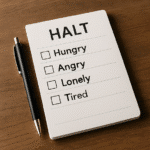Quality sleep plays an important role, improving brain performance, mood, and your overall health. When you don’t get enough sleep, or are frequently awakened, this can raise your risk for diseases and disorders, including heart disease, stroke, dementia, and mental health disorders.
A common misconception is that the brain rests when you are asleep. In fact, the brain is working to remove toxins during this time of deep sleep. These toxins build up during waking hours, affecting your ability to function and your overall mood. Sleep allows the brain to remove these toxins, giving more room to support learning and memory. When you don’t get enough sleep, or frequently waken not allowing for the deepest REM sleep, your brain is not able to purge these toxins. This can not only leave you tired but can also affect your entire mood and personality.
What Makes for Quality Sleep and Its Direct Impact on Your Mental Health
Not getting enough quality sleep will leave your brain feeling sluggish. This can make it difficult to concentrate throughout the day and to remember things. When your brain is not able to purge the toxins overnight during sleep, your entire mood and mental health will be affected. If this continues for an extended period, you will likely struggle from sleep deprivation. This lack of sleep long-term can manifest itself through feelings of irritability, short temper, aggression, and even depression and anxiety. It is not only important for your body that you get enough sleep, but for your brain as well.
Lack of sleep can significantly affect those already struggling with mental health disorders, as the brain is not able to purge toxins. Existing mental health conditions, like anxiety and depression, can be significantly worsened when you are not able to get adequate sleep. This can have an affect in as little as one night, compounding over a longer period.
Ways to Develop Good Sleeping Habits
Adults should aim to get seven or more hours of sleep each night to feel good and for optimal mental health. Ideally, this time is undisturbed rest, where you can achieve REM or deep sleep. To ensure that you are preparing your mind and body for sleep you should limit caffeine, particularly in the later afternoon and evening hours. You may assume that alcohol will help you to sleep, but on the contrary, this can actually lead to poor quality sleep with disturbances. Disconnecting from technology before bed can also set your sleep hours up for success. Keeping yourself physically strong through exercise and spending time outdoors can prepare your mind and body for shut eye.
By taking your sleep seriously and aiming to get an adequate amount while also improving the quality of your sleep, you will likely see a marked difference in your mental health. Giving your brain the right amount of time to purge toxins will leave you ready to take on the next day.





